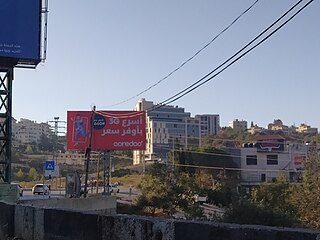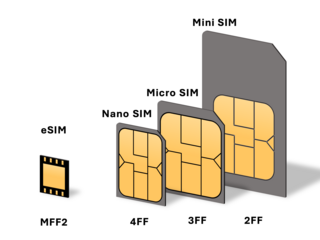Related Research Articles

Telecommunications in Cambodia include telephone, radio, television, and Internet services, which are regulated by the Ministry of Posts and Telecommunications. Transport and posts were restored throughout most of the country in the early 1980s during the People's Republic of Kampuchea regime after being disrupted under Democratic Kampuchea.
Nigeria is Africa's largest ICT market, accounting for 82% of the continent's telecoms subscribers and 29% of internet usage. Globally, Nigeria ranks 11th in the absolute number of internet users and 7th in the absolute number of mobile phones.

A SIMcard is an integrated circuit (IC) intended to securely store an international mobile subscriber identity (IMSI) number and its related key, which are used to identify and authenticate subscribers on mobile telephone devices. SIMs are also able to store address book contacts information, and may be protected using a PIN code to prevent unauthorized use.
A SIM lock, simlock, network lock, carrier lock or (master) subsidy lock is a technical restriction built into GSM and CDMA mobile phones by mobile phone manufacturers for use by service providers to restrict the use of these phones to specific countries and/or networks. This is in contrast to a phone that does not impose any SIM restrictions.

Near-field communication (NFC) is a set of communication protocols that enables communication between two electronic devices over a distance of 4 cm or less. NFC offers a low-speed connection through a simple setup that can be used for the bootstrapping of capable wireless connections. Like other proximity card technologies, NFC is based on inductive coupling between two electromagnetic coils present on a NFC-enabled device such as a smartphone. NFC communicating in one or both directions uses a frequency of 13.56 MHz in the globally available unlicensed radio frequency ISM band, compliant with the ISO/IEC 18000-3 air interface standard at data rates ranging from 106 to 848 kbit/s.

An electronic identification ("eID") is a digital solution for proof of identity of citizens or organizations. They can be used to view to access benefits or services provided by government authorities, banks or other companies, for mobile payments, etc. Apart from online authentication and login, many electronic identity services also give users the option to sign electronic documents with a digital signature.

Mobile phone tracking is a process for identifying the location of a mobile phone, whether stationary or moving. Localization may be affected by a number of technologies, such as the multilateration of radio signals between (several) cell towers of the network and the phone or by simply using GNSS. To locate a mobile phone using multilateration of mobile radio signals, the phone must emit at least the idle signal to contact nearby antenna towers and does not require an active call. The Global System for Mobile Communications (GSM) is based on the phone's signal strength to nearby antenna masts.

A mobile phone feature is a capability, service, or application that a mobile phone offers to its users. Mobile phones are often referred to as feature phones, and offer basic telephony. Handsets with more advanced computing ability through the use of native code try to differentiate their own products by implementing additional functions to make them more attractive to consumers. This has led to great innovation in mobile phone development over the past 20 years.

Gemalto was an international digital security company providing software applications, secure personal devices such as smart cards and tokens, e-wallets and managed services. It was formed in June 2006 by the merger of two companies, Axalto and Gemplus International. Gemalto N.V.'s revenue in 2018 was €2.969 billion.
A mobile signature is a digital signature generated either on a mobile phone or on a SIM card on a mobile phone.
Mobile identity is a development of online authentication and digital signatures, where the SIM card of one's mobile phone works as an identity tool. Mobile identity enables legally binding authentication and transaction signing for online banking, payment confirmation, corporate services, and consuming online content. The user's certificates are maintained on the telecom operator's SIM card and in order to use them, the user has to enter a personal, secret PIN code. When using mobile identity, no separate card reader is needed, as the phone itself already performs both functions.

Some mobile phones support use of two SIM cards, described as dual SIM operation. When a second SIM card is installed, the phone may allow users to switch between two separate mobile network services manually, have hardware support for keeping both connections in a "standby" state for automatic switching, or have two transceivers to maintain both network connections at once.

A mobile phone, or cell phone, is a portable telephone that allows users to make and receive calls over a radio frequency link while moving within a designated telephone service area, unlike fixed-location phones. This radio frequency link connects to the switching systems of a mobile phone operator, providing access to the public switched telephone network (PSTN). Modern mobile telephony relies on a cellular network architecture, which is why mobile phones are often referred to as 'cell phones' in North America.

The State of Palestine has access to Telephone, Radio, Television, and Internet services; however, it significantly trails behind global standards in these sectors. The communications landscape in the Palestinian West Bank and Gaza Strip is hindered by several challenges, including restrictions from the Oslo Accords, which limit the use of spectrum frequencies for wireless communication without Israeli approval. Consequently, this has obstructed the introduction of modern technology into the Palestinian territories.

Etiquette in technology, colloquially referred to as netiquette, is a term used to refer to the unofficial code of policies that encourage good behavior on the Internet which is used to regulate respect and polite behavior on social media platforms, online chatting sites, web forums, and other online engagement websites. The rules of etiquette that apply when communicating over the Internet are different from these applied when communicating in person or by audio or video call. It is a social code that is used in all places where one can interact with other human beings via the Internet, including text messaging, email, online games, Internet forums, chat rooms, and many more. Although social etiquette in real life is ingrained into our social life, netiquette is a fairly recent concept.
HiveColab is an innovation hub and startup incubator in Kampala, Uganda. The space was founded in 2010 and is noted as being one of Africa's first innovation hubs of note along with the IHub. HiveColab was founded by African technologist and Appfrica CEO Jon Gosier, Senegalese Born, British Businesswoman Marieme Jamme, Daniel Stern, Teddy Ruge and supported by Director Barbara Birungi. The space is funded by Appfrica, IndigoTrust and Dutch NGO Hivos. HiveColab is one of the founding members of Afrilabs a network of African innovation hubs across the continent. Barbara Birungi has stated she's passionate about how technology can change the future of Africa, for women in particular.
Jonathan D. Gosier is a software developer, investor, and philanthropist. He was named as one of Ten African Tech Voices to Follow on Twitter by CNN and one of the 25 most influential African-Americans in Technology by Business Insider. He was awarded a TED Fellowship in 2009 and later named a TED Senior Fellow. Jon is Knight News Challenge award winner for Abayima which makes crisis communications technology for disasters. In 2013 Gosier was nominated as one of three Innovators of the Year by Black Enterprise Magazine for his work with data startup MetaLayer.

Finserve Africa Limited is a mobile virtual network operator (MVNO) in Kenya. It is a wholly owned subsidiary of Equity Group Holdings and is using the Airtel Kenya network as its carrier.

An eSIM is a form of SIM card that is embedded directly into a device as software installed onto a eUICC chip. First released in March 2016, eSIM is a global specification by the GSMA that enables remote SIM provisioning; end-users can change mobile network operators without the need to physically swap a SIM from the device. eSIM technology has been referred to as a disruptive innovation for the mobile telephony industry. Most flagship devices manufactured since 2018 that are not SIM locked support eSIM technology; as of October 2023, there were 134 models of mobile phones that supported eSIMs. In addition to mobile phones, tablet computers, and smartwatches, eSIM technology is used for Internet of things applications such as connected cars, artificial intelligence translators, MiFi devices, smart earphones, smart metering, GPS tracking units, database transaction units, bicycle-sharing systems, advertising players, and closed-circuit television cameras. A report stated that by 2025, 98% of mobile network operators were expected to offer eSIMs.
Connecting Humanity is an activist collective which provides internet access to people in Gaza using donated eSIMs, allowing them to connect to networks outside of Gaza. It is run by Mirna El Helbawi, an Egyptian journalist, writer and activist. Over 200,000 people in Gaza have received internet access through an eSIM.
References
- ↑ Robertson, Jordan. "The day part of the Internet died: Egypt goes dark". The Washington Times.
- ↑ "A Brief History of the Abayima Project". Appfrica.com. Archived from the original on 2013-01-24. Retrieved 2013-01-24.
- ↑ "TED Fellow Jon Gosier Wins Knight News Challenge Mobile Grant". TED.com. 18 January 2013.
- ↑ "This App Lets Activists Pass Around Information When the Government is Watching". FastCompany.
- ↑ "Winners of the Knight News Challenge: Media Focus on Education, Human Rights". Slate.com.
- ↑ "Indigo Trust Grants Awarded". Indigo Trust.
- ↑ Sutter, John (31 January 2013). "The cell phone revolutionary". CNN. Retrieved 15 October 2013.